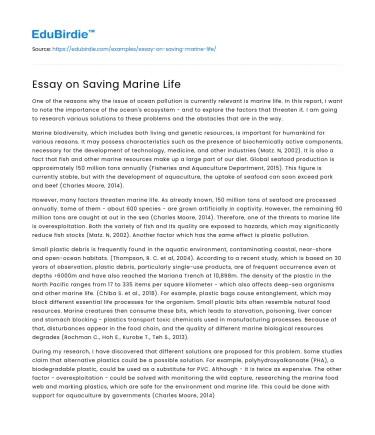One of the reasons why the issue of ocean pollution is currently relevant is marine life. In this report, I want to note the importance of the ocean's ecosystem - and to explore the factors that threaten it. I am going to research various solutions to these problems and the obstacles that are in the way.
Marine biodiversity, which includes both living and genetic resources, is important for humankind for various reasons. It may possess characteristics such as the presence of biochemically active components, necessary for the development of technology, medicine, and other industries (Matz. N, 2002). It is also a fact that fish and other marine resources make up a large part of our diet. Global seafood production is approximately 150 million tons annually (Fisheries and Aquaculture Department, 2015). This figure is currently stable, but with the development of aquaculture, the uptake of seafood can soon exceed pork and beef (Charles Moore, 2014).
Save your time!
We can take care of your essay
- Proper editing and formatting
- Free revision, title page, and bibliography
- Flexible prices and money-back guarantee
However, many factors threaten marine life. As already known, 150 million tons of seafood are processed annually. Some of them - about 600 species - are grown artificially in captivity. However, the remaining 90 million tons are caught at out in the sea (Charles Moore, 2014). Therefore, one of the threats to marine life is overexploitation. Both the variety of fish and its quality are exposed to hazards, which may significantly reduce fish stocks (Matz. N, 2002). Another factor which has the same effect is plastic pollution.
Small plastic debris is frequently found in the aquatic environment, contaminating coastal, near-shore and open-ocean habitats. (Thompson, R. C. et al, 2004). According to a recent study, which is based on 30 years of observation, plastic debris, particularly single-use products, are of frequent occurrence even at depths >6000m and have also reached the Mariana Trench at 10,898m. The density of the plastic in the North Pacific ranges from 17 to 335 items per square kilometer - which also affects deep-sea organisms and other marine life. (Chiba S. et al., 2018). For example, plastic bags cause entanglement, which may block different essential life processes for the organism. Small plastic bits often resemble natural food resources. Marine creatures then consume these bits, which leads to starvation, poisoning, liver cancer and stomach blocking - plastics transport toxic chemicals used in manufacturing processes. Because of that, disturbances appear in the food chain, and the quality of different marine biological resources degrades (Rochman C., Hoh E., Kurobe T., Teh S., 2013).
During my research, I have discovered that different solutions are proposed for this problem. Some studies claim that alternative plastics could be a possible solution. For example, polyhydroxyalkanoate (PHA), a biodegradable plastic, could be used as a substitute for PVC. Although - it is twice as expensive. The other factor - overexploitation - could be solved with monitoring the wild capture, researching the marine food web and marking plastics, which are safe for the environment and marine life. This could be done with support for aquaculture by governments (Charles Moore, 2014). However, judging by another study, the government - specifically the UN Convention on the Law of the Sea and the Convention on Biological Diversity - is not prepared to offer any kind of protection for marine resources if the problematic area is located outside the area of national jurisdiction (Matz. N, 2002). Other sources assume that regulation of the production of plastic and the flow of it into the ocean is the only way to prevent further destruction of marine ecosystems. However, the issue now affects more extreme environments, such as the deep-sea regions. Research and protection in these areas require the most advanced technology, which leads to the need of proper funding from the government (Chiba S. et al., 2018).
Marine biological resources are threatened by various factors: change or destruction of ecosystems due to pollution from different sources or human-induced disturbances such as overexploitation. The conclusion I can make judging by the studies I have researched is that the legal protection of marine resources is essential to preserve - and use - these resources for the benefit of humankind.






 Stuck on your essay?
Stuck on your essay?

